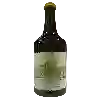
Winery Jean BourdyVin de Paille
This wine generally goes well with
Wine flavors and olphactive analysis
On the nose the Vin de Paille of Winery Jean Bourdy in the region of Jura often reveals types of flavors of non oak, earth or microbio and sometimes also flavors of vegetal, oak or tree fruit.
Details and technical informations about Winery Jean Bourdy's Vin de Paille.
Discover the grape variety: Rosé du Var
Rosé du Var rosé is a grape variety that originated in France (Provence). It produces a variety of grape specially used for wine making. It is rare to find this grape to eat on our tables. Rosé du Var rosé can be found in several vineyards: South-West, Cognac, Bordeaux, Provence & Corsica, Rhone Valley, Loire Valley, Savoie & Bugey, Beaujolais, Languedoc & Roussillon.
Last vintages of this wine
The best vintages of Vin de Paille from Winery Jean Bourdy are 0
Informations about the Winery Jean Bourdy
The Winery Jean Bourdy is one of of the world's greatest estates. It offers 23 wines for sale in the of Côtes du Jura to come and discover on site or to buy online.
The wine region of Côtes du Jura
Côtes du Jura is a regional appellation in the Jura wine region of eastern France. Introduced in 1937, it is arguably the largest appellation in the region in terms of geographical extent. In terms of quantity, it is the second largest after Arbois">Arbois. While the vast majority of Jura wines are produced in the Northern half of the region between Etoile and Arbois, the Côtes du Jura catchment area extends some distance to the South.
The wine region of Jura
The Jura is a small wine region in eastern France that is responsible for some very special and traditional wine styles. It is close to the Swiss Jura, but quite distinct from it. Wedged between Burgundy to the west and Switzerland to the east, the region is characterized by a landscape of Wooded hills and the winding topography of the Jura Mountains. The Jura vineyards cover just over 1,850 hectares, forming a narrow strip of land almost 80 km Long from North to South.
The word of the wine: Chopine
Small bottle with a capacity of 50 centilitres.














